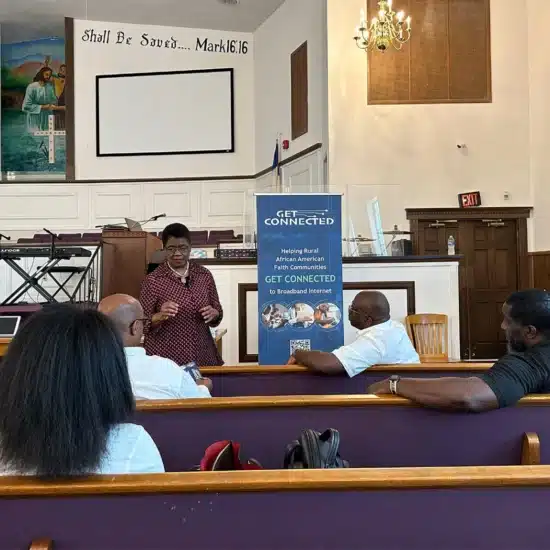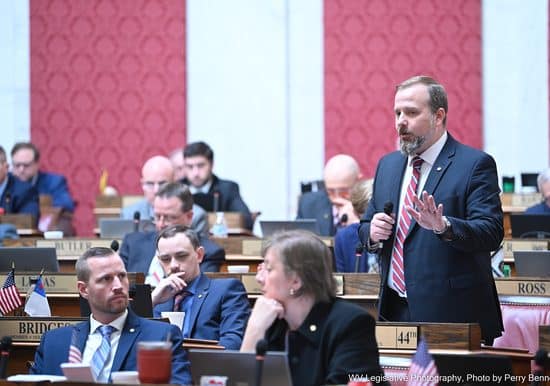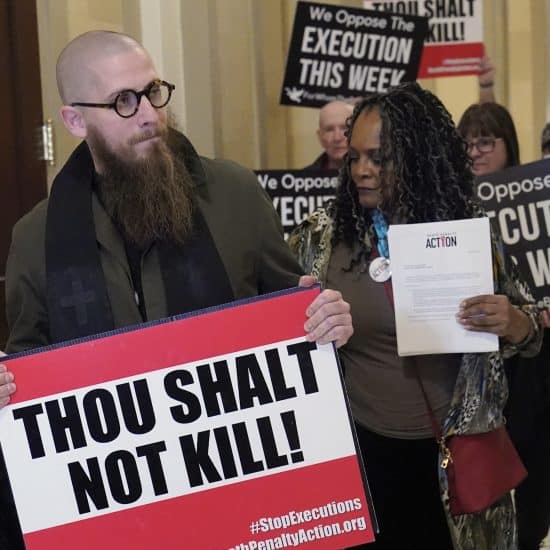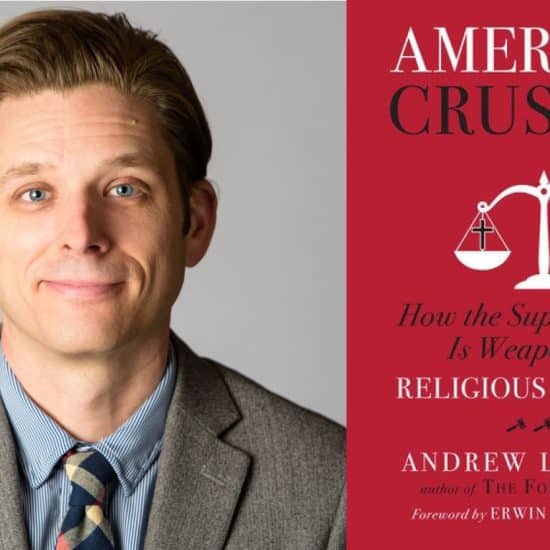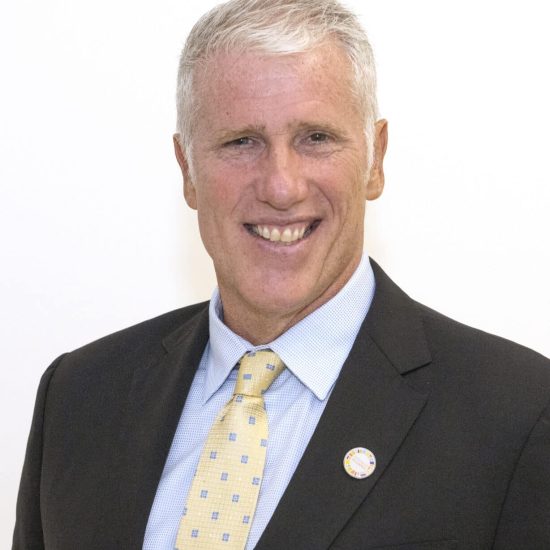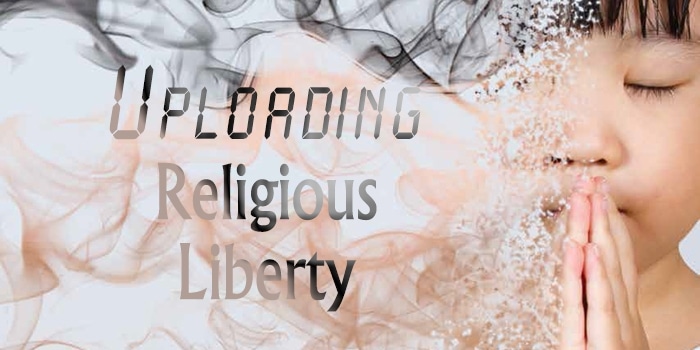
“Free speech is under assault in America,” Jerry Johnson, president of the National Religious Broadcasters, declared at a press conference in Washington, D.C., on Dec. 7. “And this is happening on the internet.”
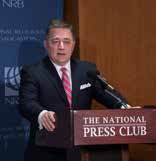 Jerry Johnson speaks about Internet Freedom Watch on Dec. 7. (National Religious Broadcasters)Thus, Johnson announced the NRB’s new initiative, Internet Freedom Watch, to monitor and expose internet censorship. Johnson said the NRB was founded in 1944 “in response to corporate censorship of evangelical radio ministries” and would use the new initiative to “defend free speech” amid “a new censorship threat, again, from the corporate realm.” A former president of Criswell College in Dallas, Texas, Johnson also previously taught at Southern Baptist Theological Seminary in Louisville, Ky., and Midwestern Baptist Theological Seminary in Kansas City, Mo.
Jerry Johnson speaks about Internet Freedom Watch on Dec. 7. (National Religious Broadcasters)Thus, Johnson announced the NRB’s new initiative, Internet Freedom Watch, to monitor and expose internet censorship. Johnson said the NRB was founded in 1944 “in response to corporate censorship of evangelical radio ministries” and would use the new initiative to “defend free speech” amid “a new censorship threat, again, from the corporate realm.” A former president of Criswell College in Dallas, Texas, Johnson also previously taught at Southern Baptist Theological Seminary in Louisville, Ky., and Midwestern Baptist Theological Seminary in Kansas City, Mo.
Johnson specifically criticized Apple, Facebook, Google and Twitter for having “bowed” to pressure “to expunge opposing viewpoints from the marketplace of ideas.” He pointed to Apple removing an app for Chuck Colson’s “Manhattan Declaration” in 2010, Facebook briefly removing a post by Mike Huckabee supporting Chick-fil-A in 2012 and YouTube and Twitter actions against conservative politicians and activists.
“It is unacceptable for these titans to discriminate against users just because their viewpoints are not congruent with ideas popular in Silicon Valley,” Johnson declared. “We call on these platforms to afford their users nothing less than the free speech and free exercise of religion rights embodied in the First Amendment as interpreted by the U.S. Supreme Court.”
Republican U.S. Senator Ted Cruz of Texas, a member of First Baptist Church in Houston, joined Johnson and other conservative activists at the NRB’s press conference. He noted that free speech protections exist for unpopular opinions, including opinions posted online.
“You actually don’t need the First Amendment for popular beliefs,” Cruz said. “The free speech protections of the First Amendment were designed to protect unpopular beliefs.”
 Jennifer HawksBeyond the NRB, other faith leaders also are keeping on an eye on internet policies. Jennifer Hawks, associate general counsel of the Baptist Joint Committee for Religious Liberty, sees internet access and usage as important for religious expression today. An 80-yearold organiza t ion that advocates for religious liberty for all, the BJC represents 15 Baptist bodies, including American Baptist Churches USA, Churchnet, Cooperative Baptist Fellowship, National Baptist Convention of America and National Baptist Convention USA.
Jennifer HawksBeyond the NRB, other faith leaders also are keeping on an eye on internet policies. Jennifer Hawks, associate general counsel of the Baptist Joint Committee for Religious Liberty, sees internet access and usage as important for religious expression today. An 80-yearold organiza t ion that advocates for religious liberty for all, the BJC represents 15 Baptist bodies, including American Baptist Churches USA, Churchnet, Cooperative Baptist Fellowship, National Baptist Convention of America and National Baptist Convention USA.
“From livestreaming worship services to accessing religious texts, the internet is an essential tool that enables religious communities to live out their faith, support fellow believers and evangelize among nonbelievers,” Hawks explained. “If corporations can arbitrarily limit access to this modern-day town square, our freedom to engage in religious expression online could be curtailed.”
International Internet Freedom
While concerns exist regarding internet polices in the U.S., religious liberty advocates see even more significant violations of internet freedoms in other countries. Nathan Wineinger, director of policy relations for 21st Century Wilberforce Initiative, has been tracking this issue carefully as part of 21 Wilberforce’s advocacy in Washington, D.C., for international religious liberty. He pointed out that technology can play an important part in spreading the gospel, discipling people and organizing ministries to help people.
 Nathan Wineinger“We believe that technology is useful for religious liberty and that it can be used against religious liberty,” he said. “The printing press changed the world and was used by religious believers to disseminate religious ideas.”
Nathan Wineinger“We believe that technology is useful for religious liberty and that it can be used against religious liberty,” he said. “The printing press changed the world and was used by religious believers to disseminate religious ideas.”
“People around the world — particularly in religious communities — are discriminated against,” he added. “But the internet provides an opportunity for individuals — including and especially Christians — to coordinate their actions, to learn about their beliefs, to share the gospel. Technology is becoming more and more a part of religious expression.”
Wineinger pointed to China as “the most extreme” example of government efforts to monitor internet activity and punish those viewed as undermining the power of the government. Human rights lawyers are disappearing, he said, and “prisoners of conscience” suffer in a prison system where “unlike American prisons, those incarcerated have no expectation of humane treatment and no legal recourse for mistreatment.” He noted “a lot of coordination for house churches happens through the internet.” Thus, internet restrictions are “cutting people off from access to information, including information about churches, about beliefs.”
“If you’re in China today and you want to go to Facebook, if you want to go to Google, if you want to go to any Western website, then you will be stopped by their firewall,” Wineinger explained.
 Elijah BrownElijah Brown, the new general secretary of the Baptist World Alliance, noted that internet restrictions globally impact many Baptists. Pointing to the analysis by Freedom House, an organization that studies democratic and political freedoms, that ranks 21 countries as “Not Internet Free” and another 28 countries as just “Partly Free,” Brown talked about the Baptists in those countries. Between those two categories, he identified 89 BWA member bodies with 75,800 churches and 16 million members.
Elijah BrownElijah Brown, the new general secretary of the Baptist World Alliance, noted that internet restrictions globally impact many Baptists. Pointing to the analysis by Freedom House, an organization that studies democratic and political freedoms, that ranks 21 countries as “Not Internet Free” and another 28 countries as just “Partly Free,” Brown talked about the Baptists in those countries. Between those two categories, he identified 89 BWA member bodies with 75,800 churches and 16 million members.
“Government restriction on internet content and internet usage remains a pressing reality for many around the world, including millions of BWA Baptists,” he said. “For 16 million Baptists, internet restrictions have significant negative ramifications, including the ability of these individuals, churches and denominations to freely share the gospel, communicate with one another, pursue additional online theological reflection or more fully engage in pursuing peace and community wellbeing within their countries.”
“Within the 21 countries in the world with the most significant internet restrictions, there are 24 BWA member bodies representing 1.4 million Baptists and 10,500 churches,” Brown added. “This includes countries in the European Baptist Federation (Belarus, Egypt, Russia, Syria, Uzbekistan), the All Africa Baptist Fellowship (Ethiopia, the Gambia, Sudan), the All Asia Pacific Federation (Myanmar, Thailand, Vietnam) and the Union of Baptists in Latin America (Venezuela). There are 65 additional BWA member bodies in 24 countries, representing 14.7 million Baptists and 65,300 churches who also find themselves in contexts of only partial internet freedom.”
Brown, who started his BWA role on Jan. 1, has long worked as an advocate for religious liberty. He noted that churches and individuals in countries with internet limitations “must carefully consider their emails and social media posts, knowing they may well be scrutinized by the government.”
Such restrictions can also “lead to real-world negative ramifications,” Brown added as he recounted two recent cases in Russia. In March 2017, Baptist leader Sergei Suprunenko was fined 5,000 rubles for creating a public online newspaper about the work of the Council of Churches Baptist. In July 2017, Baptist leader Sergei Stepanov was fined 10,000 rubles after posting an invitation to a church’s Easter worship service on social media.
“Monitored emails in one Asian country I visited in 2017 actively prevents clear communication and ministry engagement,” Brown added. “Blocked websites and government-sponsored online misinformation campaigns prevent Baptists, along with all citizens, from being able to fully and freely participate in the life of their country.”
For Brown and other religious liberty advocates, internet firewalls are like the Berlin Wall for a new generation, restricting flow of information and cutting off religious communities.
“While there will be those who misappropriate and abuse internet freedom,” Brown said, “there is a danger in government-maintained internet firewalls, government-sponsored misinformation campaigns, email and social media posts tracked by government security agencies and the use of embedded internet technology by some governments to track down individuals to fine, arrest or bring harm.”
Both Brown and Wineinger believe Christians in the U.S. should care about the internet restrictions on believers in other nations.
“We are called to care about all the tongues and tribes in the world,” Wineinger said. “We need care about the people who are suffering in Bangladesh, we need to care about the people who are suffering in China, we need to care about the policies that are causing hardship.”


